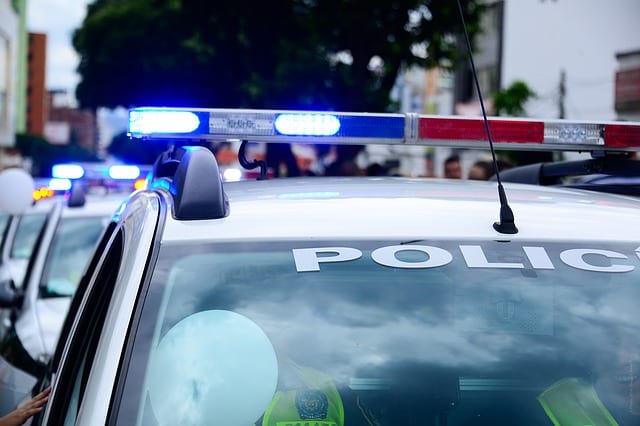
Michael was still in the shower when our ride pulled up to take us to Mass.
I was cross. I am picky about being late, especially for Mass. I called to him to hurry up and went out, grumbling.
The lady who gives us rides was patiently waiting behind the wheel, but she wasn’t watching us. She was watching the police cars down the street; there were three of them, and one ambulance. Another ambulance rolled up beside us as I apologized and promised Michael would be out soon.
They all parked near the duplex just down the street– the place that must have a very short term lease. That building is like a magician’s hat out of which anything can come at any time. That’s the place where the child I tried to help lived, before the family moved a few blocks away. It’s the place where the Mexican immigrants lived, and then disappeared. It’s the place where they keep housing the construction workers who come to work on the pipeline and then move on. Once I ended up at nice little picnic in the backyard of that house, with friendly people from a less apocalyptic corner of Appalachia playing the guitar around a fire pit and talking about how much they missed the country. Once Rosie went there to play with a gaggle of beautiful children and one very patient dog, in the dust under one of the backyard trees. They had a glorious time filling old water bottles with dust and pouring it on each other and on the dog’s back– and then, the next week, the family was gone. Once I brought a neighborhood child back to that house to get a Nerf gun he’d forgotten while playing outside with Rosie, and found a stoned man on the sofa and prescription bottles all over the mantel.
One side of the duplex has a beautiful living fence of giant sunflowers in front of the porch this summer, and the other side– well, it has nothing. The police were going up and down the stairs on the side of the duplex where the sunflowers aren’t.
The lady mentioned that she didn’t know when we’d be able to get to Mass any time soon, and she was right. In this part of LaBelle, the streets are narrow and only go one way. We were too far up the street to just back up. We were stranded behind a clot of emergency vehicles parked on the street with their lights blazing, and there was nowhere to go.
She got out of the car, and of course I followed. Rosie came next to me.
I think we’d all meant to wander by and pretend to not be looking.
Another neighbor was standing on his porch opposite the duplex, looking like a ghost: his clothes and hands caked with pure white paint, white streaks in his hair and white splatters on his face. He’s been repainting the house next door for weeks now. Rosie has been helping his older son mind their toddler while he works, for pocket change.
“I think their son overdosed,” said the ghost on the porch.
Right on queue, there was a scream.
We forgot to pretend not to look.
The police came out, each gripping the arm of a painfully skinny young man in a black tank top.
I thought “overdose” would mean an unconscious person on a gurney, but this was the opposite of a loss of consciousness. This man was so wide awake as to be completely psychotic. He pitched forward onto the porch shrieking that they were going to kill him. They bent over and pulled him back up. He pitched again. The medics and two other police ran over to help.
“That’s the man who fixed my bike,” said Rosie.
And that’s when I recognized him as well. He’s been here for a relatively long time, considering the rate that people come and go from that duplex. He occasionally wanders the block looking slightly buzzed. Half the men his age in this neighborhood seem to be “on something” most of the time. Maybe it’s alcohol, or pot, or the high doses of psychiatric medication they hand out in extra-large bottles at the notorious community mental health clinic that never sees patients for more than fifteen minutes, or else it’s something much worse. But this man had never been violent or even unpleasant. One afternoon, he wandered by and scolded us for letting Rosie ride a bike with such bad tires, slurring his words a little; then he went home for tools, and came back and showed Michael how to fix it. We thanked him, because neither Michael nor I ever learned to ride a bicycle and wouldn’t know where to start fixing one. Once he sauntered up to the porch barefoot, waving a bowl of dry Rice Krispies and a dollar, asking to borrow a serving of milk, which we gave him. When we refused the dollar, he handed it to Rosie and ordered her to spend it on the ice cream truck, which she did. She likes him.
Now he was writhing on the porch, hallucinating, while the police tried to get him down the stairs to the ambulance.
I found myself trying to come up with a second-grade appropriate explanation of what methamphetamine was, but I was drowned out.
The officers were carrying him by the arms and legs. It took several minutes for them to make the twenty-foot journey from the porch to the ambulance; then there were six people, officers and medics both, all fighting together to strap him to a gurney as he shouted at the top of his lungs that he was being killed.
His family watched from the porch, faces as blank as if they were rag dolls. It was as if every drop of emotion hand been drained from that household into the brain of one person, and that person was being packed into an ambulance and carted away.
“They’re taking him to the hospital so he can get some help to be healthy and not take drugs anymore,” I lied to Rosie. There’s no help like that available in Steubenville. There’s no rehab; they stabilize people and send them home or to prison. There’s no mental health care to be had except a monthly appointment at that terrible community clinic where you get fifteen minutes with an overworked nurse practitioner and a massive dose of pills. Your only hope, if you’re sick in Appalachia, is to get someone to send you away from Appalachia.
Somewhere in all of this, Michael came out of the house, intending to apologize for his lateness– but we weren’t in the car, and I was still trying to explain to an almost eight-year-old child that the friendly man who gave her a dollar was not, indeed, being murdered, despite his cries to the contrary.
And then we were in the car following the ambulance, because there’s only one way out of this part of LaBelle. And then we were running into Mass very late, just in time for the Gospel Acclamation. And there were no places to sit, no time to compose ourselves to pray, no mental space to think of anything until I finally caught my breath during the offertory hymn.
“Let my soul glory in the Lord, who will hear the cry of the poor,” sang the organist. “The Lord hears the cry of the poor. Blessed be the Lord!”
I hope she’s right.
(image via Pixabay)
Steel Magnificat runs almost entirely on gratuities. To tip the author, go to our donate page here.













